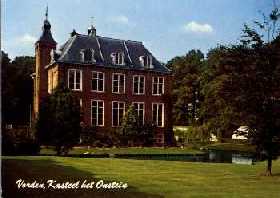Onstenk is a pre-eminent Achterhoek name that is found in many places with concentrations in Gorssel Hengelo (G) Lichtenvoorde and Zutphen. A variant of Onstein, also spelled Onstijn, which we find in the same area, but concentrations especially in Nijmegen and Rheden, that Onstenk and Onstein variants are, one would not suspect at first glance. The name comes from the castle Onstein in the hamlet Linde near Vorden; the estate includes the Groot and Klein Onstein hooves.
 |
Kasteel Onstein in Vorden |
The estate was originally an inheritance, which was listed as Onstedynck in 1488; in 1494, Peter Onstedynck was the owner of it. In 1556 there was a division by which the Groot and Klein Onstedynck heirs originated, from which last name the Klein Onstenk family came. In the eighteenth century we find several inhabitants of those heirs, who bear the name Onstenk, with a few times Onstinck; at the same time we also find Onstein. A Brigid On steninc lived in Oldenzaal in 1385; whether she had any relationship with the Vordense erve is unknown to me, but her name shows the wear of Onsteding via Onstening to Onstein. It can also come from Germany, where around 1150 at Selm in the Kreis Ladinghausen there was an Erve Unstede, now known as Unstedde. A similar name was Unstaden, mentioned in 1178 with unknown location.
From the examples mentioned we clearly recognize the word "city" or "stede", but in a different sense than the current one. It is related to "standing" and originally meant the place where something stood, usually a building. One could also indicate a piece of arable land or a farm. In English the word exists as "stead", especially in place names; the Old English form was "stede", which had quite a few meanings of which one was "an abandoned piece of land" that was no longer used. This meaning was shown in old Dutch by "urban" or "onstad"; The prefix "on" has a negative meaning, as we also find it in the East Netherlands "onland", for poor quality land. An "urban" probably became poor quality for land. An "urban" was probably taken into use later, so that an erection was created. The occupant was called the Onstedink, in which name "ink" does not mean "son of" but "admire of". The proper name passed on the inheritance, went down to Onstenk and eventually even Onstein; it is remarkable that both variants occur so close together. There are more combinations with "stede", which got the output "ink"; examples are "homestead" and "dingstede". Hofstede is a fairly general word for a large farm and we encounter it a lot in proper names, such as Hofstede, Hofstee or Hofsté, Hofstetter, probably of German descent, van der Hofstede and the Dutch Verhofstad. However, Hofsteding must also exist, especially in Drenthe; The family name Hofsteenge originates from the Drentse Hofstedinge variant. A "dingdede" was a place of law, where one kept a lawsuit; in the Middle Dutch they also spoke of "dingestat". In Drenthe south of Meppel lies the hamlet of Dingstede, from which the surname of Dingstee is derived. In 1330 there is a Dinxstadinchus, while not far from the neighborhood was the Dincstadincvene, now called Dinxterveen. In both names we meet Dinckstading, apparently to an admiration of the Dinkstad. A family name Dinksteenge could have originated from this but was not handed over.
This type of names on "ink" or "ing", in which this output means "resident of", is quite common. Examples are Overdijkink, to a neighborhood called Overdijk near Borculo; Stroink from Stordink, derived from "strode" or "stroot", which meant "marsh"; Morsink of "spill" swamp; Weustink of "weust", ferociously, for a piece of land that was not used; in meaning almost the same as "urban".
AUTHOR; B.J. Hekket

